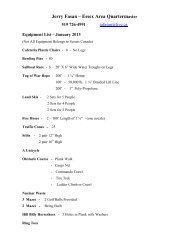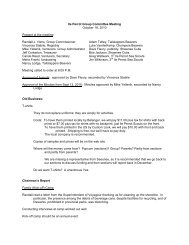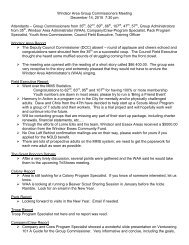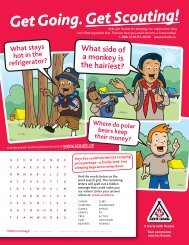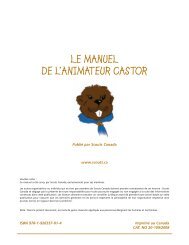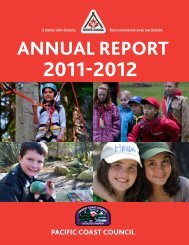Beaver Leader's Handbook - Scouts Canada
Beaver Leader's Handbook - Scouts Canada
Beaver Leader's Handbook - Scouts Canada
You also want an ePaper? Increase the reach of your titles
YUMPU automatically turns print PDFs into web optimized ePapers that Google loves.
TAKING CARE OF THE WORLD<br />
Nature is a very important element in the <strong>Beaver</strong> program. As an organization, <strong>Scouts</strong> <strong>Canada</strong><br />
clearly states that:<br />
4 The outdoors provides an ideal setting for growth and recreation.<br />
4 Responsible citizenship imposes upon all of us an increasing obligation to live in harmony<br />
with the natural environment.<br />
These beliefs mean that outdoor activities and a heightened awareness of nature are essential<br />
parts of all Scouting programs, including <strong>Beaver</strong>s.<br />
Real understanding develops from doing or experiencing something. When children have firsthand<br />
experience, they usually learn quickly. It’s essential to provide them with activities that promote<br />
greater understanding of ecological relationships; these activities should promote a sense<br />
of responsibility for improving the quality of the environment.<br />
Whenever possible, link indoor learning about birds, for example, with outdoors activities. In a<br />
world growing increasingly sensitive to environmental issues, it’s more important than ever to<br />
help young people build a strong sense of understanding, appreciation and wonder.<br />
Here’s an easy way to develop a series of programs with a nature theme. Choose a topic (e.g.<br />
astronomy), and build a series of evenings around it. Include stories, a film, games adapted to<br />
space themes, crafts (like making flying saucers or a space shuttle), and identify simple constellations<br />
on a clear winter night. Visit a planetarium if there is one in your area.<br />
It’s also possible to plan a program on environmental quality for <strong>Beaver</strong>s. Visit a water purification<br />
plant or a recycling centre. Ask these questions: How are lakes and rivers polluted? What<br />
kinds of environmental problems affect big cities? Why do people litter?<br />
Organize a “litter chase” when you go on an outing in a community park. Help put up bird houses,<br />
and ask your group committee to inform your local newspaper in advance.<br />
CHANGING SEASONS<br />
Although we outline a variety of specific program ideas later in this chapter, let’s look at seasonal<br />
patterns as a major program source. The variety of changes and the interrelationships of the<br />
seasons provide a rich store of material.<br />
It’s fall when <strong>Beaver</strong>s come together in their colonies. Take a look at the season. How do we know<br />
it’s here? What causes fall? Some animals are preparing for winter. How are they doing it?<br />
Watch for and talk about migratory birds. If your community is on a major flight path, visit a local<br />
marsh at sunset. Talk about the effect weather has on birds. Take a walk to collect weed bouquets,<br />
seeds, leaves and caterpillar cocoons. You can adapt films, stories, songs, crafts and games<br />
to fit seasonal focuses very effectively.<br />
As you plan a winter outing, develop a program around questions like: Where and how do insects<br />
and animals spend the winter? What causes the winter season? How do plants and trees survive<br />
the winter?<br />
On your outing, separate into lodges and search for dry nests. Find other animal homes. Find<br />
tracks and follow them. Set up feeders for the birds that stay over winter in your area.<br />
15-1



